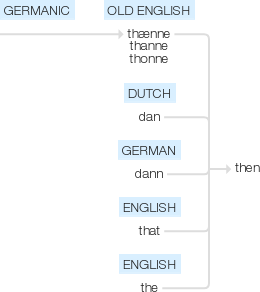Then
Old English thænne, thanne, thonne, of Germanic origin; related to Dutch dan and German dann, also to that and the.
wiktionary
From Middle English then( ne), than( ne), from Old English þonne, þanne, þænne(“then, at that time”), from Proto-Germanic *þan(“at that (time), then”), from earlier *þam, from Proto-Indo-European *tóm, accusative masculine of *só(“demonstrative pronoun, that”). Cognate with Dutch dan(“then”), German dann(“then”), Icelandic þá(“then”). Doublet of than.
etymonline
then (adv.)
adverb of time, Old English þanne, þænne, þonne, from Proto-Germanic *thana- (source also of Old Frisian thenne, Old Saxon thanna, Dutch dan, Old High German danne, German dann), from PIE demonstrative pronoun root *to- (see the).
As a conjunction, "in that case, therefore," in Old English. As an adjective, "being at that time," from 1580s. As a noun from early 14c. For further sense development, see than. Similar evolutions in other Germanic languages; Dutch uses dan in both senses, but German has dann (adv.) "then," denn (conj.) "than." Now and then "at various times" is attested from 1550s; earlier then and then (c. 1200).
